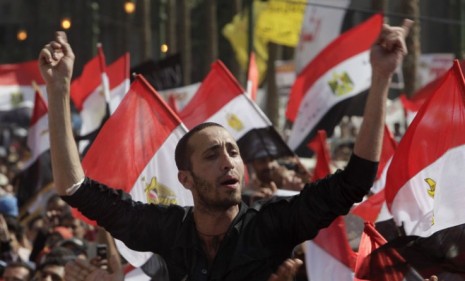Why Egypt's revolution stalled: 3 theories
Protesters are back on the streets of Cairo, demanding faster democratic reforms. How did they go from jubilation to frustration so quickly?

A free daily email with the biggest news stories of the day – and the best features from TheWeek.com
You are now subscribed
Your newsletter sign-up was successful
Protesters have returned to Cairo's Tahrir Square, and vow to stay until the ruling military council enacts democratic reforms. The Supreme Council of the Armed Forces, which has been in charge in Egypt since longtime president Hosni Mubarak stepped down in February, warned activists not to "deviate from the peaceful approach during demonstrations and sit-ins, or obstruct the institutions of the state." How did the country's revolution go from success to stalemate in just four months? Here, three theories:
1. The old guard is resisting change
"The street has been boiling with anger," says The Egyptian Gazette in an editorial, because people are frustrated over "the slow pace at which the Interior Ministry is being purged of corrupt leaders." The new government has also been sluggish in putting members of the former regime on trial and in compensating the revolution's victims.
The Week
Escape your echo chamber. Get the facts behind the news, plus analysis from multiple perspectives.

Sign up for The Week's Free Newsletters
From our morning news briefing to a weekly Good News Newsletter, get the best of The Week delivered directly to your inbox.
From our morning news briefing to a weekly Good News Newsletter, get the best of The Week delivered directly to your inbox.
2. Protesters agree on little other than the need for change
When Egyptians from all walks of life first gathered in Tahrir Square to overthrow the government, says Anthony Shadid in The New York Times, they shared "a unity of purpose." But that "has given way to a multiplicity of demands," with diverse factions arguing bitterly over "the timing of elections, the power of Islamists, the weakness of civilian rulers," and the military's lack of accountability. Egypt has hit an impasse because now, nobody is getting what they want.
3. The Muslim Brotherhood is ruining everything
Members of the Muslim Brotherhood joined the crowd in Tahrir Square on Friday, says Armin Rosen at The New Republic, apparently eager to scare the military by showing they could turn on the ruling council at any time. Egypt's liberals say they won't end their sit-in until all of their demands, including speedy trials and other reforms, are met. But their influence is limited as long as "a powerful, often selfish Muslim Brotherhood" pursues a completely different agenda that runs counter to the pro-democracy crowd's.
A free daily email with the biggest news stories of the day – and the best features from TheWeek.com
-
 Political cartoons for February 16
Political cartoons for February 16Cartoons Monday’s political cartoons include President's Day, a valentine from the Epstein files, and more
-
 Regent Hong Kong: a tranquil haven with a prime waterfront spot
Regent Hong Kong: a tranquil haven with a prime waterfront spotThe Week Recommends The trendy hotel recently underwent an extensive two-year revamp
-
 The problem with diagnosing profound autism
The problem with diagnosing profound autismThe Explainer Experts are reconsidering the idea of autism as a spectrum, which could impact diagnoses and policy making for the condition